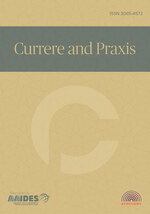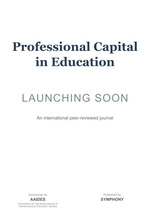Understanding Chinese Principalship—An autobiographical approach
DOI:
https://doi.org/10.70116/2980274132Keywords:
Autobiography, Chinese principalship, Confucian culture, GuanxiAbstract
Cultural context matters in leadership. Traditions and cultures may saliently impact how leadership is conceptualized and enacted in practice. With the influence of Chinese traditions and culture, particularly Confucianism and Confucian culture, Chinese principal leadership may differ from the dominant leadership approaches that reign in the literature. Therefore, an in-depth understanding of leadership in a Chinese context is long overdue. Informed by an autobiographical approach, this study aims to explore a Chinese principal’s daily leadership practices. Autobiography renders accounts of layered reality, affords access to inner experiences, and unpacks the rationale in decision-making when engaging in the leadership process. The influence of various traditional (particularly Confucian) culture variables is crystalized through the subjective experience of the principal, as articulated in the autobiography and the analysis followed. This study provides an example of how traditional (particularly Confucian) culture permeates into a principal’s daily practice, including how the principal understands his role and deals with guanxi (network of relationships) using leadership tactics.
Downloads
References
Atkinson, R. (2002). The life story interview. In J. F. Gubrium & J. A. Holstein (Eds.), Handbook of interview research: Context and method (pp. 121–140). Sage Publications.
Ayers, W. (1990). Small Heroes: In and out of school with 10-year-old city kids. Cambridge Journal of Education, 20(3), 269–278. DOI: https://doi.org/10.1080/0305764900200306
Begg, A. (2011). Reflecting on writing autobiographically. Policy Future in Education, 9(2), 145-150 DOI: https://doi.org/10.2304/pfie.2011.9.2.145
Bennis, W. (1989). On becoming a leader. Addison Wesley.
Bruner, J. (1986). Actual minds, possible worlds. Harvard University Press. DOI: https://doi.org/10.4159/9780674029019
Bush, T., & Glover, D. (2014). School leadership models: What do we know?. School Leadership & Management, 34(5), 553–571. DOI: https://doi.org/10.1080/13632434.2014.928680
Buttery, E., & Leung, T. (1998). The difference between Chinese and Western negotiations. European Journal of Marketing, 32(3-4), 374–89. DOI: https://doi.org/10.1108/03090569810204652
Chen, G., & Chung, J. (1993). The impact of Confucianism on organizational communication. Paper presented at the Annual Meeting of the Speech Communication Association. November 18-21, 1993, Florida.
Chen, X. (2007). The role of principal in the process of implementing the new curriculum: A self narrative study of a primary school principal (Unpublished master’s dissertation). Northeast Normal University, Changchun, Jilin, China.
Cheng, C. Y. (1987). Chinese philosophy and contemporary human communication theory. In D. L. Kincaid (Ed.), Communication theory: Eastern and Western perspectives (pp. 23–43). Harcourt Brace Jovanovich. DOI: https://doi.org/10.1016/B978-0-12-407470-5.50008-6
De Jong, M. (2012). The pros and cons of Confucian values in transport infrastructure development in China. Policy and Society, 31(1), 12–24. DOI: https://doi.org/10.1016/j.polsoc.2012.01.005
Eagly, A. H., Johannesen-Schmidt, M. C., & Van Engen, M. L. (2003). Transformational, transactional, and laissez-faire leadership styles: A meta-analysis comparing women and men. Psychological Bulletin, 129(4), 569-591. DOI: https://doi.org/10.1037/0033-2909.129.4.569
English, F. W. (2006). Understanding leadership in education: Life writing and its possibilities. Journal of Educational Administration and History, 38(2), 141–154. DOI: https://doi.org/10.1080/00220620600555121
Graham, R. (1991). Reading and writing the self: Autobiography in education and curriculum. Teacher College Press.
Gray, J. (2000). The two faces of liberalism. The New Press.
Gronn, P. (2005). Leading questions: Questions about autobiographical leadership. Leadership, 1(4), 481–490. DOI: https://doi.org/10.1177/1742715005057234
Grumet, M. (1990). Retrospective: Autobiography and the Analysis of Educational Experience. Cambridge Journal of Education, 20(3), 321–325. DOI: https://doi.org/10.1080/0305764900200311
Harris, A. (2004). “Distributed Leadership and School Improvement: Leading or Misleading?” Educational Management, Administration and Leadership, 32(1), 11–24. DOI: https://doi.org/10.1177/1741143204039297
Harris, A. (2010). Distributed leadership: Current evidence and future directions. In T. Bush, L. Bell, and D. Middlewood (Eds.), The principles of educational leadership and management, (pp. 55–69). Sage.
Hirst, H. (1974). Knowledge and the Curriculum. Routledge & Kegan Paul.
House, R. J., Hanges, P. J., Javidan, M., Dorfman, P. W., & Gupta, V. (2004). Culture, leadership and organisations: The GLOBE study of 62 societies. Sage.
Katriel, T. (1986). Talking straight: Dugri speech in Israeli Sabra culture. Cambridge University Press.
Lebra, T. (1976). Japanese patterns of behavior. The University Press of Hawaii. DOI: https://doi.org/10.1515/9780824846404
Leithwood, K., Jantzi, D., & Steinbach, R. (1999). Changing leadership for changing times. Open University Press. DOI: https://doi.org/10.1108/ijem.1999.13.6.301.4
Ling, W., Chia, R. C., & Fang, L. (2000). Chinese implicit leadership theory. The Journal of Social Psychology, 140, 729–739. DOI: https://doi.org/10.1080/00224540009600513
Loh, J. (2013). Inquiry into issues of trustworthiness and quality in narrative studies: A Perspective. The Qualitative Report, 18(33), 1–15.
Luo, Y. D. (1997). Guanxi: Principles, philosophies, and implications, Human Systems Management, 16, 43–51. DOI: https://doi.org/10.3233/HSM-1997-16106
Mathias, B., & Smith, A. (2015). Autobiographies in organizational research: Using leaders’ life stories in a triangulated research design. Organizational Research Methods, 19(2). 204–230. DOI: https://doi.org/10.1177/1094428115618761
Nakamura, H. (1964). Ways of thinking of Eastern people: India, China, Tibet and Japan. University of Hawaii Press. DOI: https://doi.org/10.1515/9780824845025
Northouse, P. G. (2013). Leadership: Theory and practice (6th ed.). Sage.
Oduro, G., Dachi, H., Fertig, M., & Rarieya, J. (2007, September). Examining educational leadership and quality in developing countries. In 9th UKFIET International Conference on Education and Development.
Okabe, K. (1987). Indirect speech acts of the Japanese. In D. L. Kincaid (Ed.), Communication theory: Eastern and Western perspectives (pp. 127-136). Academic Press. DOI: https://doi.org/10.1016/B978-0-12-407470-5.50015-3
Pinar, W. (2011). What is curriculum theory? (1st ed.). Routledge. DOI: https://doi.org/10.1057/9780230337886_1
Pinar, W. F. (1995). Autobiography, politics, and sexuality: Essays in curriculum theory 1972-1992. Peter Lang.
Polkinghorne, D. E. (2007). Validity issues in narrative research. Qualitative Inquiry 13(4), 471–486. DOI: https://doi.org/10.1177/1077800406297670
Pye, L. W. (1992). The spirit of Chinese politics. Harvard University Press.
Qian, H.Y. (2008, October-November). The secondary school principalship in China: Leading at the cusp of Change. Paper presented in a symposium session entitled School Leader Development in Chinese Societies – Emerging Understandings at the University Councilfor Educational Administration Annual Convention, Orlando, FL.
Riessman, C. K. (2008). Narrative methods for the human sciences. Sage Publications.
Ryan, P., Xiao, C., & Merry, R. (1998). In search of understanding: A qualitative comparison of primary school management in the Shaanxi region of China and England. Compare, 28, 171–182. DOI: https://doi.org/10.1080/0305792980280205
Samier, E. A. (2016). New biographical studies for educational leadership: Challenges from a postcolonial and globalizing world. Educational Administration and Leadership, 1(2), 187–228. DOI: https://doi.org/10.30828/real/2016.2.2
Schenck, A., & Waddey, M. (2017). Examining the impact of Confucian values on leadership preferences. Journal of Organizational & Educational Leadership, 3(1), 1-26.
Shang, Y. (2017). The Book of Lord Shang: Apologetics of State Power in Early China. Columbia University Press. DOI: https://doi.org/10.7312/shan17988
Su, C., & Littlefield, E. (2001). Entering guanxi: a business ethical dilemma in mainland China? Journal of Business Ethics, 33, 199 – 210. DOI: https://doi.org/10.1023/A:1017570803846
Suntzu. (2010). The art of war. Capstone Publishing.
Walker, A., Hu, R., & Qian, H. (2012). Principal leadership in China: An initial review. School Effectiveness and School Improvement, 23(4), 369–399. DOI: https://doi.org/10.1080/09243453.2012.678863
Wang, J., Wang, G., Ruona, W. E. A., & Rojewski, J. W. (2005). Confucian values and the implications for international HRD, Human Resource Development International, 8(3), 311-326. DOI: https://doi.org/10.1080/13678860500143285
Wang, T. (2007). Understanding Chinese educational leaders’ conceptions in an international education context. International Journal of Leadership in Education, 10(1), 71–88. DOI: https://doi.org/10.1080/13603120500445275
Wang, W. (2020). Chinese currere, subjective reconstruction and attunement. Palgrave Macmillan. DOI: https://doi.org/10.1007/978-3-030-41061-2
Wang, W. (2024). Currere as punctuated manifestation. Currere and Praxis, 1(1), 43-52. DOI: https://doi.org/10.70116/3065457239
Yum, J. O. (1987). The practice of Uye-Ri in interpersonal relationships. In D. L. Kincaid (Ed.), Communication theory: Eastern and Western perspectives (pp. 87–100). New York: Academic. DOI: https://doi.org/10.1016/B978-0-12-407470-5.50012-8
Yum, J. O. (1988). The impact of Confucianism on interpersonal relationships and communication patterns in East Asia. Communication Monograph. 55(4). 374—388. DOI: https://doi.org/10.1080/03637758809376178
Downloads
Published
How to Cite
Issue
Section
License
Copyright (c) 2024 Symphony

This work is licensed under a Creative Commons Attribution 4.0 International License.














